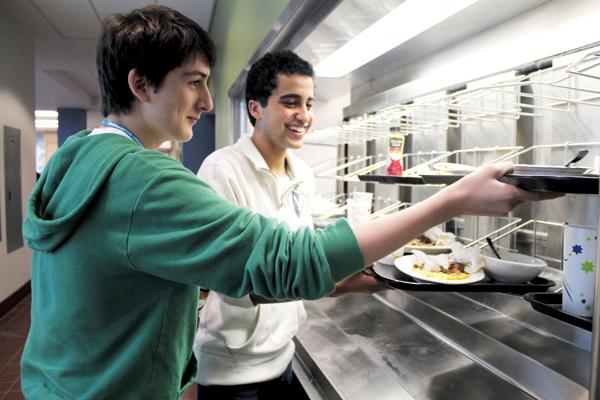
Sodexo is taking the old saying “one man’s trash is another man’s treasure” and giving it to the dogs — or more specifically, to the sheep and the pigs.
Richard Herb, College-in-the-Woods Dining Hall’s chef manager, has sought to expand the waste management efforts he makes on behalf of Sodexo on a larger, community-oriented basis.
Six years ago, Herb teamed up with Juliet Berling, a former Binghamton University professor of environmental studies, to try to achieve a more efficient composting system on campus.
The University’s Office of Recycling and Resource Management took over the program three years ago, and since has stepped up levels of composting and distributed the meaty soil to locations around the science buildings and educational gardens on campus.
Herb recalled the incident that gave him inspiration to do even more to make productive use of food waste.
“There was this huge shipment of watermelon,” he said. “We’re talking thousands of them. They all went bad. That’s when I was asked [myself], ‘Can you use this for compost, Rich?’ I brought a batch of the spoiled melons to a compost pile and when I came back later I had to sit and wait for the deer to move before I could put the next batch down. Who knew deer loved watermelon?”
Most recently, Herb started a nonprofit service, Natural by Nature, that aims to help local farmers by providing them with food waste from restaurants — which otherwise would be thrown out — to feed livestock. The animals, including sheep, pigs and chickens, are only those that go to feed the farmers and their families, as per the farmers’ agreements with Herb. He in turn receives the animals’ manure for use by Sodexo for composting at local off-campus sites.
Herb said that both the restaurants and farmers he has dealt with were not initially receptive to the bargain.
“The problem was change,” he said. “People have become used to a certain way of living. I come to a restaurant and ask them for their waste and then it becomes an issue of trust. The restauranteur has to worry about the capacity for which our agreement can be held. Likewise the farmers are just as wary. I tell them that I can deliver them free food for any extra animals they would need. No charge. It sounds too good to be true.”
Herb arranges with the individual farmers with whom he does business how much food waste they need for how many animals and what days he should make deliveries. Eventually, his business partners came to like the service.
“[The restaurants] feel good, the food is going to a good cause,” Herb said.
He said creative and innovative solutions are needed to reduce waste levels across society.
“We eat with our eyes and when something looks good but maybe doesn’t taste exactly the way we would like, it is thrown away. A bagel that falls on the floor, while me or you wouldn’t eat it, a pig would have no problem with it,” he said. “Animals can benefit greatly from our waste and it all starts with the proper removal.”
In each Sodexo kitchen on campus, there are separate, color-coded barrels for recycling and food waste. Herb said it was a system that every kitchen in the world ought to employ.
Martin Larocca, the environmental resources manager for the Offices of Recycling Resource Management, has also helped to extend the composting program to community gardens across the city of Binghamton.
“We are working with Rich and his company in order to compost as much waste as possible,” Larocca said. “With recent improvements to the composting, there will be an even purer product for the community.”


